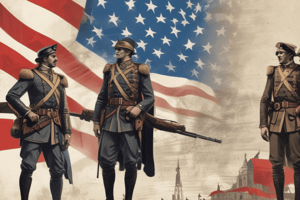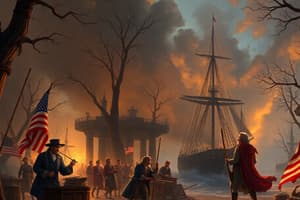Podcast
Questions and Answers
What did the French ministers demand during the XYZ Affair?
What did the French ministers demand during the XYZ Affair?
- An apology from the U.S.
- A loan and a bribe (correct)
- Access to American ports
- A trade agreement
Which legislation faced harsh criticism during its enactment in relation to civil liberties?
Which legislation faced harsh criticism during its enactment in relation to civil liberties?
- Alien and Sedition Acts (correct)
- Homestead Act
- Emancipation Proclamation
- Civil Rights Act
What did the Virginia and Kentucky Resolutions assert regarding federal laws?
What did the Virginia and Kentucky Resolutions assert regarding federal laws?
- State governors can override federal laws
- Federal laws take precedence over state laws
- States must always comply with federal laws
- States can declare federal laws unconstitutional (correct)
Which conflict is often referred to as the 'Quasi War'?
Which conflict is often referred to as the 'Quasi War'?
What was one primary consequence of the XYZ Affair for U.S. foreign relations?
What was one primary consequence of the XYZ Affair for U.S. foreign relations?
Who won the election referred to in the content?
Who won the election referred to in the content?
The __________ was a reaction to the increasing secularism in the United States after the Revolution.
The __________ was a reaction to the increasing secularism in the United States after the Revolution.
Federalists would win another presidential election after the election mentioned.
Federalists would win another presidential election after the election mentioned.
Which of the following statements did Thomas Jefferson make?
Which of the following statements did Thomas Jefferson make?
What was the purpose of the Cotton-Gin invented by Eli Whitney?
What was the purpose of the Cotton-Gin invented by Eli Whitney?
What was Jefferson's stance on internal taxes?
What was Jefferson's stance on internal taxes?
Napoleon sold the entire Louisiana Territory to the United States for __________.
Napoleon sold the entire Louisiana Territory to the United States for __________.
Jefferson's administration refused to deal with piracy in the Mediterranean.
Jefferson's administration refused to deal with piracy in the Mediterranean.
What incident involved the British impressment of American sailors?
What incident involved the British impressment of American sailors?
Match the following figures or events with their significance:
Match the following figures or events with their significance:
Flashcards
XYZ Affair
XYZ Affair
French ministers demanded a loan for France and a bribe before negotiations.
Quasi War
Quasi War
An undeclared war between the US and France.
Alien and Sedition Acts
Alien and Sedition Acts
Laws that restricted immigration and speech criticizing the government
Virginia and Kentucky Resolutions
Virginia and Kentucky Resolutions
Signup and view all the flashcards
Nullification
Nullification
Signup and view all the flashcards
Jefferson's Election
Jefferson's Election
Signup and view all the flashcards
Midnight Appointments
Midnight Appointments
Signup and view all the flashcards
Jefferson's Vision
Jefferson's Vision
Signup and view all the flashcards
Republican Motherhood
Republican Motherhood
Signup and view all the flashcards
Cotton Gin Impact
Cotton Gin Impact
Signup and view all the flashcards
Jefferson's Presidency (Limited Government)
Jefferson's Presidency (Limited Government)
Signup and view all the flashcards
Marbury v. Madison
Marbury v. Madison
Signup and view all the flashcards
Louisiana Purchase
Louisiana Purchase
Signup and view all the flashcards
Barbary Pirates
Barbary Pirates
Signup and view all the flashcards
War of 1812 Causes
War of 1812 Causes
Signup and view all the flashcards
Tecumseh
Tecumseh
Signup and view all the flashcards
Battle of Tippecanoe
Battle of Tippecanoe
Signup and view all the flashcards
The Second Great Awakening
The Second Great Awakening
Signup and view all the flashcards
Deism
Deism
Signup and view all the flashcards
Judicial Review
Judicial Review
Signup and view all the flashcards
Study Notes
XYZ Affair
- French ministers demanded a bribe and a loan from the United States before they would negotiate with the U.S.
- The demand was rejected, leading to heightened tensions between the two countries.
- The XYZ Affair solidified anti-French sentiment in the United States and contributed to the Quasi-War.
Alien and Sedition Acts
- The Alien and Sedition Acts faced harsh criticism for curtailing civil liberties.
- The acts increased the residency requirement for citizenship from five to fourteen years.
- They also allowed for the deportation of immigrants deemed dangerous to the United States.
- The acts further criminalized criticism of the government.
Virginia and Kentucky Resolutions
- The Virginia and Kentucky Resolutions asserted that states had the right to nullify federal laws they deemed unconstitutional.
- These resolutions reflected the growing tensions between federalists and republicans over the balance of power between the states and the federal government.
Quasi-War
- An undeclared naval war between the United States and France occurred from 1798 to 1800.
- This conflict was referred to as the Quasi-War.
- It was a series of naval engagements and skirmishes due to continued tensions after the XYZ Affair.
Primary Consequence of the XYZ Affair
- The XYZ Affair caused a shift in U.S. foreign policy.
- The United States abandoned its neutrality and engaged in a quasi-war with France.
Presidential Election of 1800
- Thomas Jefferson won the presidential election of 1800.
- The election marked a transfer of power from the Federalist Party to the Democratic-Republican Party.
The Second Great Awakening
- The Second Great Awakening was a reaction to the increasing secularism in the United States after the Revolution.
- It was a period of widespread religious revivalism characterized by emotional preaching and personal conversion.
- It emphasized personal piety and social reform and led to the establishment of new Protestant denominations.
Federalist Victory in 1804
- Federalists won another presidential election after the election of 1800.
- In the 1804 election, Federalist candidate Charles Cotesworth Pinckney lost to Democratic-Republican candidate Thomas Jefferson.
Thomas Jefferson's Statement
- Thomas Jefferson stated that "the government is best which governs least."
- This statement reflects his belief in limited government and individual liberty.
Cotton Gin
- Eli Whitney invented the cotton gin to separate cotton fibers from seeds.
- The cotton gin transformed the cotton industry by greatly increasing the efficiency of cotton production.
- This led to a surge in cotton production in the South and fueled the expansion of slavery.
Jefferson's Stance on Internal Taxes
- Thomas Jefferson opposed internal taxes.
- He believed that such taxes would favor wealthy interests at the expense of ordinary citizens.
- He favored tariffs and other measures that would raise revenue without placing a direct burden on individuals.
Louisiana Purchase
- Napoleon sold the entire Louisiana Territory to the United States for $15 million.
- This doubled the size of the United States and provided access to the Mississippi River and the port of New Orleans.
- The acquisition of the Louisiana Territory was a key milestone in westward expansion.
Piracy in the Mediterranean
- Jefferson's administration was criticized for its refusal to deal with piracy in the Mediterranean.
- This led to the Barbary Wars (1801-1805) where the United States was forced to negotiate with the Barbary pirates for the release of American ships and sailors.
Impressment Incident
- The Chesapeake-Leopard Affair was an incident in 1807 involving the British impressment of American sailors.
- British warship Leopard fired on American frigate Chesapeake to search for deserters, leading to increased Anglo-American tensions.
Significant Figures and Events
- George Washington - First president of the United States, helped establish the nation's government and set precedents for the presidency.
- James Madison - Fourth president of the United States, authored the Constitution and the Bill of Rights.
- John Adams - Second president of the United States, faced challenges during the Quasi-War and helped to solidify the nation's place in the world.
- Thomas Jefferson - Third president of the United States, known for his democratic ideals, advocated for limited government, and oversaw the Louisiana Purchase.
- Alexander Hamilton - First Secretary of the Treasury, helped to establish a sound financial system for the United States and played a significant role in shaping early American economic policies.
- The Louisiana Purchase: - Doubled the size of the United States, provided access to the Mississippi River, and opened up vast territories for westward expansion.
- The XYZ Affair - Increased anti-French sentiment and contributed to the Quasi-War.
- The Alien and Sedition Acts - Curtailed civil liberties, increased residency requirement for citizenship, and allowed for the deportation of immigrants deemed dangerous to the United States.
- The Virginia and Kentucky Resolutions - Asserted that states had the right to nullify federal laws, reflecting the growing debate between federalists and republicans over the balance of power.
- The Second Great Awakening: - A period of widespread religious revivalism that emphasized personal piety and social reform.
Studying That Suits You
Use AI to generate personalized quizzes and flashcards to suit your learning preferences.




